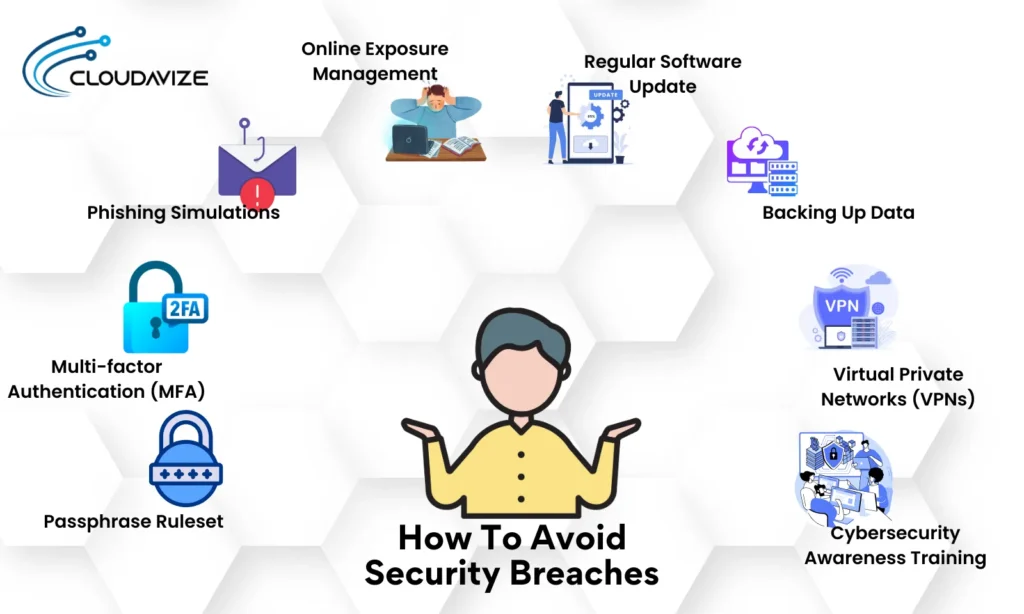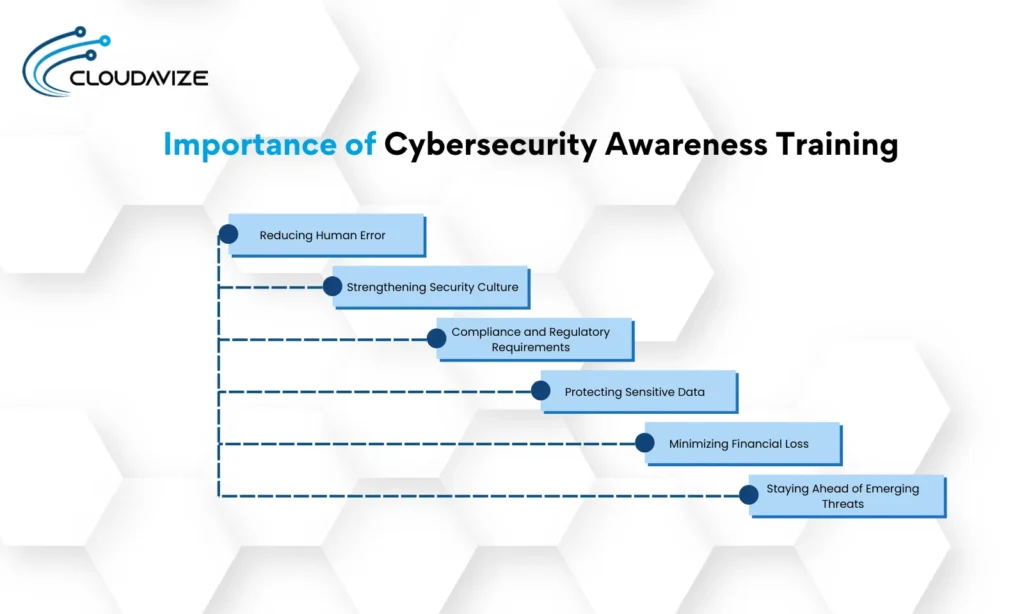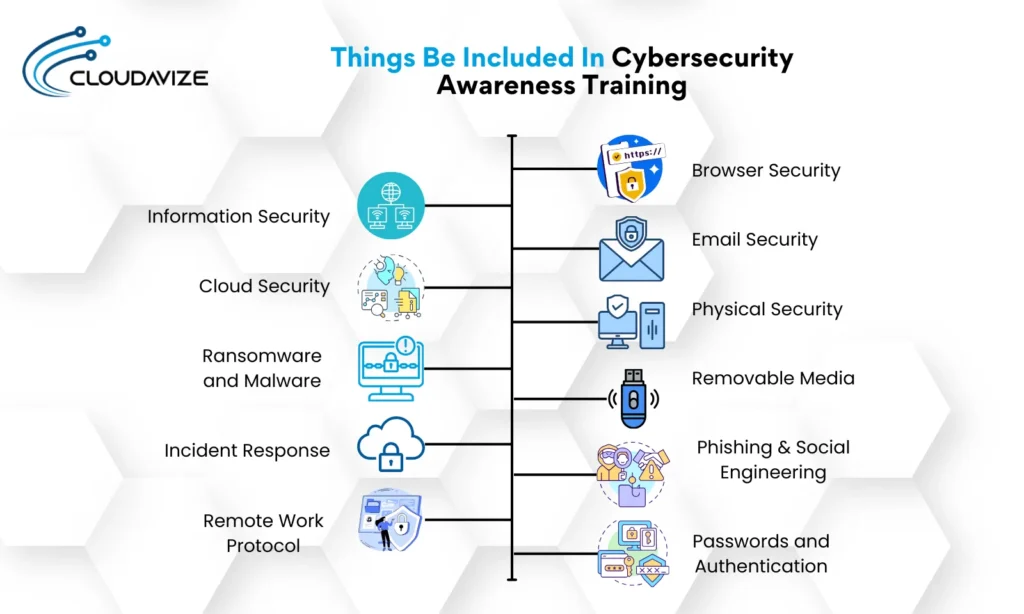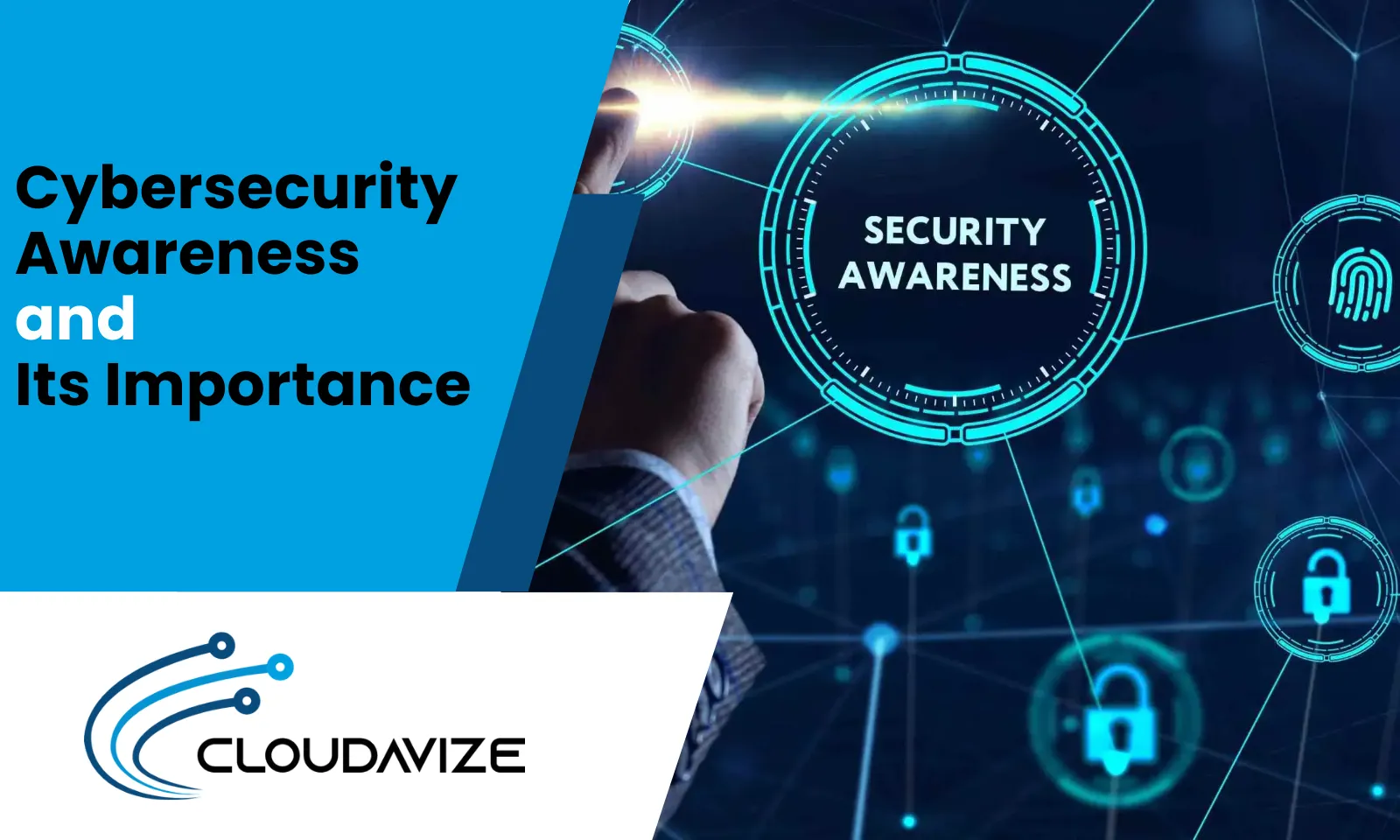Cybersecurity awareness involves understanding threats like malware, phishing, ransomware, and social engineering. It emphasizes recognizing unusual activities, implementing preventive measures, and practicing secure online behaviors such as multi-factor authentication and strong passwords. Regular training and updates are crucial to equip individuals and organizations against evolving threats. The average data breach cost in 2024 was $4.88 million, and Cybercrime Magazine predicts global cybercrime to rise by 15% annually and reach $10.5 trillion by 2025, underlining the need for robust cybersecurity practices.
The importance of cybersecurity lies in preventing data breaches, reducing human error, ensuring compliance, and safeguarding reputations. Historical breaches, including Equifax and Marriott incidents, illustrate the severe impacts of inadequate awareness. Preventive strategies include passphrase rules, multi-factor authentication, and regular backups, which fortify defenses against breaches.
Cybersecurity awareness training equips individuals with essential knowledge to identify threats, protect sensitive data, and comply with regulations like GDPR. Key training areas include data handling, ransomware defense, incident response, secure remote work protocols, and browser and email security. Global initiatives, such as Cybersecurity Awareness Month (NCSAM), CISA events, and European Cyber Security Month, actively promote awareness and resilience.
With cybercrime risks escalating, partnering with a managed service provider helps foster a culture of vigilance through comprehensive training and proactive cybersecurity measures. Robust cybersecurity solutions are vital to mitigating financial and reputational losses while enhancing overall security posture.
Table of Contents
What Is Cybersecurity Awareness?
Cybersecurity awareness is the knowledge and understanding of cyber threats, risks, and best practices that individuals and organizations can use to protect themselves. It involves knowing about cyber threats like malware, phishing, ransomware, and social engineering attacks. Along with recognizing digital threats, cybersecurity awareness empowers individuals to implement preventive measures to avoid security breaches.
Educating people about the deceitful tactics and techniques cybercriminals use to exploit vulnerabilities is necessary to attain a secure online environment. Employees can become capable enough to recognize unusual system behavior, unwanted access attempts, and suspicious emails through training and awareness campaigns. Regular security updates are also essential for managing a safe digital space. Helping employees practice safe online behaviors such as using secure networks for file transfer, enabling multi-factor authentication, and using strong passwords is essential. With the ever-evolving digital landscape, being up-to-date with the latest security trends and technologies is vital. Regular security protocol updates and security audits promote a robust defense system protecting against potential breaches.
Why Is Cybersecurity Awareness Important?
Cybersecurity awareness is essential to prevent costly data breaches, protect against cyber threats, enable regulatory compliance, reduce human error, establish a security culture, and protect reputation. It is the first line of defense against potential threats and risks. Via cybersecurity alertness, employees can recognize and avoid being victims of possible attacks, significantly lowering the risk of human errors, phishing attacks, and stolen information. Businesses with weak cybersecurity strategies become easy targets for attackers, which can result in massive financial losses. Stolen credentials, damage to IT infrastructure, and damaged reputation tag along. So, raising mindfulness about online security and implementing robust measures is significant to protect intellectual property and avoid credibility damage.
The importance of cybersecurity services is of keen interest, and to emphasize that aspect, Cybersecurity Awareness Month is celebrated every October. It is dedicated to educating people and business houses about the relevance of cybersecurity practices. Historical breaches, such as the 2017 Equifax breach caused by unpatched software vulnerabilities and human error, underscore the devastating impact of inadequate cybersecurity awareness. The 2019 First American Financial Corp. data leak, the 2014 JPMorgan Chase data breach, the 2018 Marriott Hotels cyberattacks, and the 2014 eBay data breach are well-known incidents caused by weak data security. These incidents caused a massive upheaval and hampered the company’s prestige and trust among its customers.
Therefore, adhering to cybersecurity alertness culture and deploying effective measures, targeting information security awareness, data security awareness, software security awareness, social media security awareness, and IT security awareness, is essential for business continuity and success.
How To Avoid Security Breaches?

To avoid security breaches and protect sensitive information and systems, these practices must be followed
- Passphrase Ruleset: Use passphrases using numbers, letters, and special characters.
- Multi-factor Authentication (MFA): MFA adds an extra layer of verification, reducing the risk of unauthorized access.
- Phishing Simulations: Conduct phishing simulations to train employees in recognizing phishing attempts.
- Online Exposure Management: Limit access to sensitive information that is shared publicly.
- Regular Software Update: Regularly update software with the latest security patches.
- Backing Up Data: Regular backup helps secure data and prevent data loss.
- Virtual Private Networks (VPNs): Use VPNs to encrypt data and secure network connections.
- Cybersecurity Awareness Training: Provide frequent employee training to inform them of cyber threat trends and countermeasures.
- Hiring a Managed Service Provider (MSP) for Cybersecurity: Engage a Managed Service Provider that specializes in providing cybersecurity as a service. They can offer ongoing monitoring, threat detection, and response, as well as manage security updates and patches, ensuring that your organization stays protected against evolving cyber threats.
What Is Cybersecurity Awareness Training?
Cybersecurity awareness training is a comprehensive educational program designed to educate employees about cyber threats and the methods to recognize and react to these threats. This training equips people and businesses with the necessary knowledge regarding threat identification and risk mitigation while fostering the culture of best online practices and compliance training.
Digital awareness training helps employees stay informed about online threats and equips them with fundamental knowledge to take appropriate actions to maintain personal and organizational information security. This training teaches individuals to report suspicious activities to related authorities and adhere to best security practices. Training can be delivered via online courses, interactive workshops, classroom sessions, and simulated phishing exercises. Doing so will help individuals make informed decisions and remain vigilant against emerging cyber threats.
Importance of Cybersecurity Awareness Training

Cybersecurity awareness training is crucial to empower employees with the necessary knowledge to identify cyber threats, which helps prevent and mitigate risks. It helps safeguard valuable data and avert financial loss and damage to reputation. Some of the critical reasons highlighting the importance of cybersecurity mindfulness training are given below:
- Reducing Human Error: Helps identify and avoid common mistakes such as clicking on malicious links, falling for phishing scams, or mishandling sensitive data.
- Strengthening Security Culture: Fosters a strong security culture where employees are equipped with the necessary knowledge and skills to safeguard against online threats.
- Compliance and Regulatory Requirements: Ensures compliance with the General Data Protection Regulation (GDPR) and Health Insurance Portability and Accountability Act (HIPAA) for data protection measures.
- Protecting Sensitive Data: Effective handling of sensitive data while protecting it from accidental exposure and unauthorized access.
- Minimizing Financial Loss: Preventing data breaches, system downtime, and reputational damage helps tackle financial impact.
- Staying Ahead of Emerging Threats: Remaining informed about emerging threats and the knowledge to handle and tackle them.
What Should Be Included In Cybersecurity Awareness Training?

Cybersecurity awareness training must cover information security, cloud security, cyber attacks, and incident response to equip employees with the necessary skills and knowledge to safeguard information from data loss and other emerging threats. The following points must be covered in the cybersecurity awareness training
- Information Security: Employees should learn how to handle, share, store, back up, and dispose of sensitive information such as Personally Identifiable Information (PII), Protected Health Information (PHI), and Intellectual Property (IP) safely. Compliance with regulations like GDPR and data privacy laws is crucial to prevent data breaches and legal penalties. Data breaches and unauthorized access are possible threats that can be mitigated through data encryption, regular data audits, and secure data handling practices.
- Cloud Security: Cloud Security should include best practices for protecting data and applications in cloud environments. This includes understanding the shared responsibility model and using robust security configurations. Possible threats related to cloud security include data breaches and misconfigured cloud settings. Knowledge about strong authentication methods, regular security assessments, and data encryption can help tackle these threats.
- Ransomware and Malware: Employees should be aware of the various types of malicious software, including ransomware, that can encrypt data and demand a ransom. Training about regular software updates, regular backups, and the use of anti-malware tools is necessary to avoid data loss and financial extortion.
- Incident response: Training should cover the procedures and actions during and after a security breach. This includes immediate response actions, containment strategies, and communication protocols. They must be taught about having a well-defined incident response plan and clear communication channels to avoid delayed response time.
- Remote Work Protocol: Security considerations for remote work environments, including secure access methods and Virtual Private Networks (VPNs), should be emphasized. Training must focus on implementing secure remote desktop protocols and VPNs to mitigate unauthorized access and secure home networks.
- Browser Security: Employees should be trained on safe web browsing practices, securing web browsers, internet usage, Wi-Fi security, and social media policies. They should be informed about threats like phishing sites and malicious sites. Training them to dodge suspicious links using secure browsers and enabling browser security settings must also be prioritized.
- Email Security: This includes understanding phishing attacks and general email use, such as recognizing suspicious emails and avoiding clicking on unknown links or attachments. They should be aware of spam detection tools, phishing simulations, and email filtering while avoiding email spoofing.
- Physical Security: Knowledge about securing devices such as smartphones, tablets, laptops, and desktops, especially in Bring Your Own Device (BYOD) environments, must be provided. They must be trained in device encryption, remote wipe capabilities, and secure storage practices.
- Removable Media: Understanding the risks and policies associated with using external storage devices like USB drives so that threats like data theft and malware introduction can be averted. Using encrypted drives and scanning devices for malware must be taught.
- Phishing & Social Engineering: Training on tactics that manipulate individuals into divulging confidential information, including phishing, leading to unauthorized access and credential theft, must be provided. Some possible solutions that should be a priority are robust authentication methods and regular phishing simulations.
- Passwords and Authentication: Employees must be informed about the threats of using weak passwords and password reuse. Knowledge regarding managing secure passwords for strong authentication via multi-factor authentication and enforcing strong passwords needs to be provided.
10 Cybersecurity Public Awareness Campaigns You Can Attend
The 10 cybersecurity public awareness campaigns that help individuals know about the latest industry trends, threats, and best practices and are noteworthy of attending include
1. National Cybersecurity Awareness Month (NCSAM)
NCSAM is organized by the U.S. Department of Homeland Security and the National Cyber Security Alliance. It features events, webinars, and resources to raise cybersecurity awareness.
2. Stop.Think.Connect
Led by the STOP. THINK. CONNECT. Messaging Convention, Inc., this global campaign offers educational materials, toolkits, and resources to stay safe online and maintain security precautions.
3. Cybersecurity and Infrastructure Security Agency (CISA) Events
CISA events are organized by the CISA, a U.S. Department of Homeland Security division, which covers topics like cyber threat intelligence, critical infrastructure protection, and emergency planning through sessions, conferences, and webinars.
4. Stay Safe Online by the National Cyber Security Alliance (NCSA)
NCSA organizes the Stay Safe Online campaign to educate the public on safe online behaviors and practices. This initiative usually includes activities in the form of interactive sessions and educational webinars.
5. SANS Institute Cybersecurity Awareness Summit
Hosted by the SANS Institute, this annual event educates professionals on effective strategies for awareness and training through case studies, practical workshops, and the latest research.
6. European Cyber Security Month (ECSM)
Coordinated by the European Union Agency for Cybersecurity (ENISA), ECSM, held every October across Europe, aims to promote cybersecurity among individuals and businesses. Various awareness-raising events, training sessions, and conferences are conducted.
7. Black Hat Briefings and Trainings
Black Hat hosts this initiative and provides in-depth sessions and hands-on workshops on the latest cybersecurity research, tools, and trends. Experts from the field offer briefing and training sessions.
8. RSA Conference
RSA Conference covers topics like threat detection and response to privacy and compliance. It is one of the largest global cybersecurity conferences where security professionals impart their knowledge to attendees through keynote speeches, sessions, and panel discussions.
9. Info-security Europe
This annual conference brings together cybersecurity professionals worldwide to share knowledge and insights. The event includes a comprehensive program of keynotes, seminars, and workshops, providing valuable information on the latest cybersecurity trends and technologies.
10. DEF CON
One of the oldest and largest hacker conventions, DEF CON, attracts cybersecurity professionals, researchers, and enthusiasts. The event features talks, workshops, and competitions, offering a deep dive into the latest in cybersecurity.



